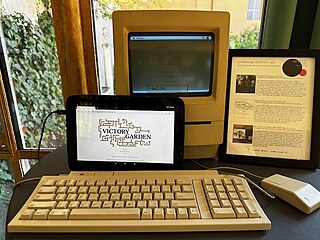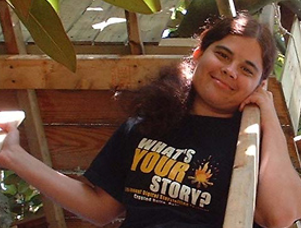
Hypertext is text displayed on a computer display or other electronic devices with references (hyperlinks) to other text that the reader can immediately access. Hypertext documents are interconnected by hyperlinks, which are typically activated by a mouse click, keypress set, or screen touch. Apart from text, the term "hypertext" is also sometimes used to describe tables, images, and other presentational content formats with integrated hyperlinks. Hypertext is one of the key underlying concepts of the World Wide Web, where Web pages are often written in the Hypertext Markup Language (HTML). As implemented on the Web, hypertext enables the easy-to-use publication of information over the Internet.

Robert Lowell Coover is an American novelist, short story writer, and T. B. Stowell Professor Emeritus in Literary Arts at Brown University. He is generally considered a writer of fabulation and metafiction.
Hypertext fiction is a genre of electronic literature, characterized by the use of hypertext links that provide a new context for non-linearity in literature and reader interaction. The reader typically chooses links to move from one node of text to the next, and in this fashion arranges a story from a deeper pool of potential stories. Its spirit can also be seen in interactive fiction.
Narratology is the study of narrative and narrative structure and the ways that these affect human perception. It is an anglicisation of French narratologie, coined by Tzvetan Todorov. Its theoretical lineage is traceable to Aristotle (Poetics) but modern narratology is agreed to have begun with the Russian formalists, particularly Vladimir Propp, and Mikhail Bakhtin's theories of heteroglossia, dialogism, and the chronotope first presented in The Dialogic Imagination (1975).
Electronic literature or digital literature is a genre of literature where digital capabilities such as interactivity, multimodality or algorithmic text generation are used aesthetically. Works of electronic literature are usually intended to be read on digital devices, such as computers, tablets, and mobile phones. They cannot be easily printed, or cannot be printed at all, because elements crucial to the work cannot be carried over onto a printed version.

afternoon, a story, spelled with a lowercase 'a', is a work of electronic literature written in 1987 by American author Michael Joyce. It was published by Eastgate Systems in 1990 and is known as one of the first works of hypertext fiction.
George Paul Landow was Professor of English and Art History Emeritus at Brown University. He was a leading authority on Victorian literature, art, and culture, as well as a pioneer in criticism and theory of Electronic literature, hypertext and hypermedia. He also pioneered the use of hypertext and the web in higher education.

Victory Garden is a work of electronic literature by American author Stuart Moulthrop. It was written in StorySpace and first published by Eastgate Systems in 1991. Victory Garden is one of the earliest examples of hypertext novels, and is notable for being very inventive and influential in its genre. It is often discussed along with Michael Joyce's afternoon, a story as an important work of hypertext fiction.
Stuart Moulthrop is an innovator of electronic literature and hypertext fiction, both as a theoretician and as a writer. He is author of the hypertext fiction works Victory Garden (1992), which was on the front-page of the New York Times Book Review in 1993, Reagan Library (1999), and Hegirascope (1995), amongst many others. Moulthrop is currently a Professor of Digital Humanities in the Department of English, at the University of Wisconsin–Milwaukee. He also became a founding board member of the Electronic Literature Organization in 1999.
Eastgate Systems is a publisher and software company headquartered in Watertown, Massachusetts, which publishes hypertext.

Kate Pullinger is a Canadian novelist and author of digital fiction, and a professor of Creative Writing at Bath Spa University, England.

The Bondwoman's Narrative is a novel by Hannah Crafts who claimed to have escaped from slavery in North Carolina. The manuscript was not authenticated and properly published until 2002. Some scholars believe that the novel was written between 1853 and 1861. It is one of the very first books by an African-American woman, others including the novel Our Nig by Harriet Wilson, published in 1859, and the autobiography Incidents in the Life of a Slave Girl by Harriet Jacobs, published in 1861.

Deena Larsen is an American new media and hypertext fiction author involved in the creative electronic writing community since the 1980s. Her work has been published in online journals such as the Iowa Review Web, Cauldron and Net, frAme, inFLECT, and Blue Moon Review. Since May 2007, the Deena Larsen Collection of early electronic literature has been housed at the Maryland Institute for Technology in the Humanities.
Inanimate Alice is an ongoing digital novel, an interactive multimodal fiction, relating the experiences of aspiring game designer Alice Field and her imaginary digital friend, Brad, in episodes, journals, social media, and virtual reality. Episodes 1–4 of the series were written by novelist Kate Pullinger and developed by digital artist Chris Joseph as a prequel to an original screenplay by series producer Ian Harper. Episode 1 was released in 2005.
Marjorie Coverley Luesebrink was an American writer, scholar, and teacher. Writing hypermedia fiction under the pen name M.D. Coverley, she is best known for her epic hypertext novels Califia (2000) and Egypt: The Book of Going Forth by Day (2006). A pioneer born-digital writer, she is part of the first generation of electronic literature authors that arose in the 1987–1997 period. She was a founding board member and past president of the Electronic Literature Organization and the first winner of the Electronic Literature Organization Career Achievement Award, which was named in her honor. Lusebrink was professor emeritus, School of Humanities and Languages at Irvine Valley College (IVC).
"I Have Said Nothing" is an early work of hypertext fiction written by J. Yellowlees Douglas. In 1993 it was published by Eastgate Systems, Inc. in The Eastgate Quarterly Review of Hypertext , along with “Lust” by Mary-Kim Arnold. In 1997, Norton Anthology published an online version of the work, along with Michael Joyce's afternoon, a story as part of its print publication Norton Anthology of Postmodern American Fiction.
Astrid Christina Ensslin is a German digital culture scholar, and Professor of Dynamics of Virtual Communication Spaces at the University of Regensburg. Ensslin is known for her work on digital fictions and video games, and her development of narratological theory to encompass digital narratives. Ensslin is known for her critical scholarship on digital fictions and video games, and her development of narratological theory to encompass digital narratives.
Kathleen McConnell is a Canadian academic and writer. A professor of English literature at St. Thomas University in Fredericton, New Brunswick, she has published both academic literature under her own name and poetry under the pen name Kathy Mac.
Jane Johnson was an English vicar’s wife who wrote letters, poetry, children’s fiction and teaching aids. Although none of her work was published during her life, it has since been studied as part of the history of education, children’s fiction, and epistolary literacy.







